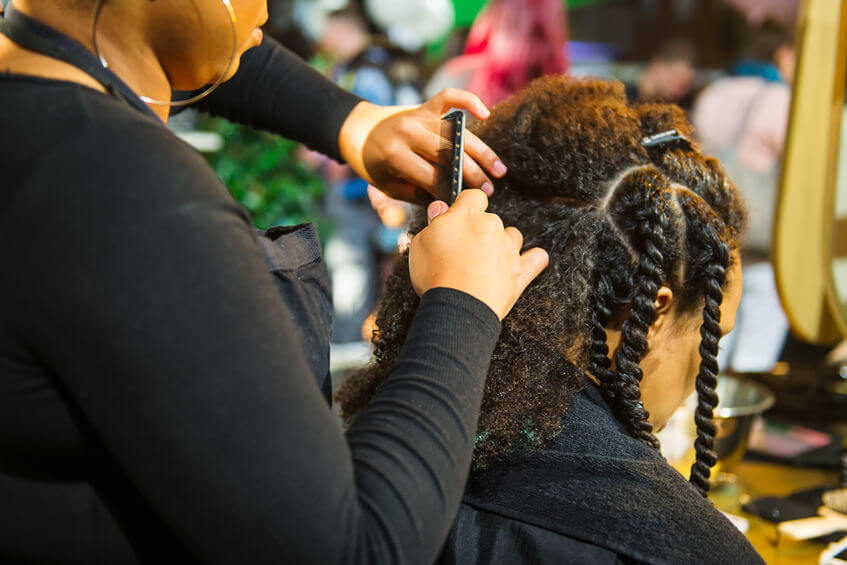Black hair is versatile. From weaves to cornrows, perms to box braids, our hair is beautiful and fun. In recent years, many of us have embraced our natural kinks and coils but this movement has brought the realisation that most mainstream salons are not ready to handle Afro hair. Louise Chandler recently caught up with hair stylist, salon owner and trainer Yinka Babalola to learn more about her one-woman crusade to encourage better understanding and care for Black hair in mainstream salons.

Confirming what many of us knew already, fashion blogger and founder of Big Hair No Care! Freddie Harrel conducted a social experiment a couple of years ago that highlighted common responses from salons when asked to do Afro hair, from “we charge an extra £10 because your hair takes longer!” to flat out “no, we can’t do it.”
Thankfully, many of us know where to go when it comes to looking after our crowns, there are many Black-owned salons and ‘Aunties’ to go to but for others, finding a hair stylist who is knowledgeable and experienced to deal with our kinks and curls can become a headache, especially for those who live outside London.
Determined to do her bit to make the hair industry wake up and pay attention to our hair needs, Yinka Babalola, a hair stylist and business owner for more than 20 years is preparing to launch a new training academy to upskill the next generation of Afro hair stylists so they can learn the trade and raise awareness of dealing with Afro hair.
Louise Chandler recently caught up with her to find out more.
How did you become a hair stylist?
I grew up in Nigeria and learnt how to do basic hair styles for Black woman, such as braiding etc. I learnt by watching others and practicing. After moving to Britain in 1990 and settling in Reading, I noticed that there was only one Black hair salon. They didn’t do walk ins and only accepted customers by appointments. In 2000, I opened my first salon and shop. I eventually moved to bigger premises to build up my customer base.
Explain what you do now?
I opened my hair salon in Bracknell, Berkshire in 2018 and I noticed that I am the only salon serving Afro Caribbean hair in the town. When I started my recruitment process, I struggled to find staff who could look after Afro hair. This continued for over eight months. It dawned on me that there are not a lot of places to learn the skills, so I decided to encourage others to learn how to style and look after Afro Caribbean hair. My plan is to create apprenticeship training and accelerated courses. I think there is an urgent need to train the next generation of hair stylists that can cater to Black hair to keep the industry alive and make sure people understand how to style and care for our hair.
Why are you starting the hair academy now?
I think the Black hair industry needs a bit of a shake up and a new approach. Black hair is unique, and it has different and specific needs, for example, it needs moisture in different ways. Even cutting Black hair is different, it requires a different skill set. I’ve heard that some Black and mixed-race hair women are rejected from mainstream salons because hair stylists don’t know how to style and look after thicker hair types so I think we can do a lot better.
“I believe that the talent, passion and interest is there but there aren’t enough opportunities for training and learning to look after Afro hair.”
What are your plans to train the new generation of hair stylists to cater to Black hair?
I believe that the talent, passion and interest is there but there aren’t enough opportunities for training and learning to look after Afro hair. There are no official qualifications, regulations or certification which means there’s a lack of structure to learn and progress in the Black hair industry.
I want to start the training courses to encourage men and women to learn the techniques to look after Afro hair types. I have carried out a lot of research at colleges and Afro hair styling is not taught and I fear the skills and expertise could fade away. Our hair is very versatile. and it should be celebrated so braids, twists, weaves and much more are recognised as normal and not different.
What is the state of the Black hair industry now?
A lot of people tell me they’re learning to do hair on YouTube but that doesn’t give you all of the skills that you need and there will be gaps in learning. Working as a hair stylist involves learning about hair types, techniques, customer service, how to order stock and how to run a salon which is the type of knowledge that I would like to share.
What is the future plan for your academy and business?
In the future, I would like to create and open a Black hair recruitment agency where qualified staff can work in different salons to provide services for Black hair across the country. It would also be good to have a National Black Hair Association so that Black salons can talk, share ideas, network and learn together so our industry is a regulated and the profession has the respect it deserves.
I want to see our industry celebrated so our profession receives the positive reputation it deserves!












